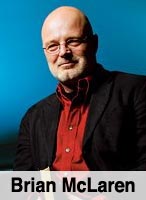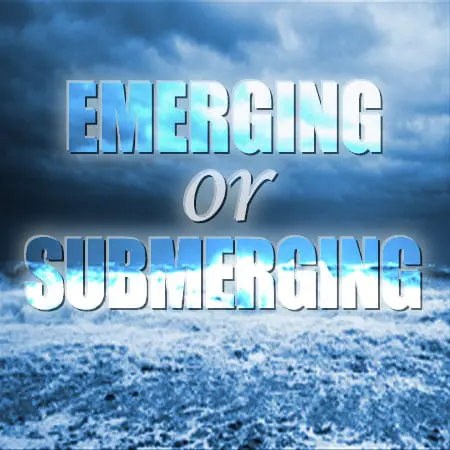By Dave Fiorazo
WARNING: The author of this article has determined that ignoring the following information may be hazardous to your spiritual health, and that choosing to do nothing with this knowledge may grieve the Holy Spirit and cause regret; but taking action may strengthen your faith. “Dear friends, although I was very eager to write to you about the salvation we share, I felt I had to write and urge you to contend for the faith that was once for all entrusted to the saints. For certain men whose condemnation was written about long ago have secretly slipped in among you. They are godless men, who change the grace of our God into a license for immorality and deny Jesus Christ our only Sovereign and Lord.” (Jude 1:3-4)
The emerging church is a movement of the late 20th and early 21st century that crosses a number of theological boundaries: participants can be described as evangelical, post-evangelical, liberal or post-liberal, reformed, neo-charismatic, and post-charismatic. They seek to live their faith in what they believe to be a"Postmodern" society. It is a rapidly growing network of individual believers and churches who would prefer to be understood as a conversation or a friendship rather than an organization. What those involved mostly agree on is their disdain and disillusionment with the organized and institutional church. The emergent church favors the use of simple story and narrative. Members of the movement often place a high value on good works or social activism. The hallmark of the emergent church is the new age aspect including the practice of contemplative monastic meditation and prayers. While some emphasize eternal salvation, many in the emerging church emphasize the here and now. Much of its doctrine rejects systematic Christian theology, the integrity of Scripture, and gospel exclusivity. They don’t believe Christianity is the true religion and they promote homosexuality. They call for diversity, tolerance and camaraderie among all religions, and they modify and expand their teachings. It is a war against the Truth.
At an emergent church workshop in San Diego, Tony Jones said, "This is about our belief that theology changes. The message of the gospel changes. It’s not just the method that changes." What? I submit to you that Jesus never changed his message to fit the times. Books, sermons and articles have been and will be written about the emergent church, and I’ve come to realize that too many believers are at times uninterested, uninformed, or just plain apathetic about the Bible and understanding the times we live in. There’s plenty of information out there if you’re interested in doing the research. You may even know their names. They are best-selling authors in Christian stores, speakers at our music festivals, and well-known leaders in Christian circles. Please read the following quotes from emergent church leaders, keeping the following verses in mind:
“The Spirit clearly says that in later times some will abandon the faith and follow deceiving spirits and things taught by demons.” 1 Timothy 4:1
“Even from your own number men will arise and distort the truth in order to draw away disciples after them.” Acts 20:30
 "Going to heaven is like going to Philadelphia… There are many ways…It doesn’t make any difference how we go there. We all end up in the same place." 1a
"Going to heaven is like going to Philadelphia… There are many ways…It doesn’t make any difference how we go there. We all end up in the same place." 1a
"On the other hand, we are hard-pressed to find any biblical basis for condemning deep love commitments between homosexual Christians as long as those commitments are not expressed in sexual intercourse." 1b
"But the overwhelming population of the gay community that love Jesus, that go to church, that are deeply committed in spiritual things, try to change and can’t change…" 1c
"…we want to see God at work converting society, converting the systems, so that there aren’t the racist overtones, the economic injustices, the polluting of the atmosphere." 1d
"I learn about Jesus from other religions. They speak to me about Christ, as well."1e
"I’m not convinced that Jesus only lives in Christians." 1f
(Tony Campolo is an author, professor of Sociology at Eastern College, former spiritual counselor to President Bill Clinton, and a leader of the movement called "Red Letter Christians".)
***
 "I don’t believe making disciples must equal making adherents to the Christian religion. It may be advisable in many (not all!) circumstances to help people become followers of Jesus and remain within their Buddhist, Hindu or Jewish contexts…" 2a
"I don’t believe making disciples must equal making adherents to the Christian religion. It may be advisable in many (not all!) circumstances to help people become followers of Jesus and remain within their Buddhist, Hindu or Jewish contexts…" 2a
"Yes, I find a character named God who sends a flood that destroys all humanity except Noah’s family, but that’s almost trivial compared to a deity who tortures the greater part of humanity forever in infinite eternal conscious torment, three words that need to be read slowly and thoughtfully to feel their full import." 2b
"For many Christians, their faith is primarily about what happens to people after they die. That distracts them from seeking justice and living in a compassionate way while we’re still alive in this life. We need to go back and take another look at Jesus’ teachings about hell. For so many people, the conventional teaching about hell makes God seem vicious. That’s not something we should let stand." 2c
"In this light, a god who mandates an intentional supernatural disaster leading to unparalleled genocide is hardly worthy of belief, much less worship. How can you ask your children…to honor a deity so uncreative, over reactive, and utterly capricious regarding life?" 2d
(Brian McLaren is the founding pastor of Cedar Ridge Community Church in Spencerville, MD, he serves as a board chair for Sojourners, an emergent church leader and a founding member of Red Letter Christians.)
***
 "I don’t think that abortion is the moral equivalent issue to slavery…I think poverty is the new slavery. Poverty and global inequality are the fundamental moral issues of our time. That’s my judgment." 3a
"I don’t think that abortion is the moral equivalent issue to slavery…I think poverty is the new slavery. Poverty and global inequality are the fundamental moral issues of our time. That’s my judgment." 3a
"Christianity will be impotent to lead a conversation on sexuality and gender if we do not bodily integrate our current understandings of humanity with our theology. This will require us to not only draw new conclusions about sexuality but will force us to consider new ways of being sexual." 3b
"As more Christians become influenced by liberation theology, finding themselves increasingly rejecting the values of institutions of capitalism, they will also be drawn to the Marxist analysis and praxis that is so central to the social justice movement." 3c
(Jim Wallis is a writer and political activist, best known as the founder and editor of Sojourners’ Magazine, for which he admitted to accepting money from George Soros, who has financed groups supporting abortion and atheism; Wallis has been arrested 22 times for acts of civil disobedience, and he serves as a spiritual adviser to President Obama.)
***
 “What if tomorrow someone digs up definitive proof that Jesus had a real, earthly, biological father named Larry, and archeologists find Larry’s tomb and do DNA samples and prove beyond a shadow of a doubt that the virgin birth was just a bit of mythologizing the Gospel writers threw in to appeal to the followers of the Mithra and Dionysian religious cults that were hugely popular at the time of Jesus, whose gods had virgin births? …Could you still be a Christian? Is the way of Jesus still the best possible way to live?” 4a
“What if tomorrow someone digs up definitive proof that Jesus had a real, earthly, biological father named Larry, and archeologists find Larry’s tomb and do DNA samples and prove beyond a shadow of a doubt that the virgin birth was just a bit of mythologizing the Gospel writers threw in to appeal to the followers of the Mithra and Dionysian religious cults that were hugely popular at the time of Jesus, whose gods had virgin births? …Could you still be a Christian? Is the way of Jesus still the best possible way to live?” 4a
*This writer is concerned that Rob had his bell rung one too many times.
(Rob Bell is the founding pastor of Mars Hill Bible Church in Grand Rapids, MI, and a popular icon in the emergent church movement.)
Related information from GFM:
Rob Bell: Populating Hell (Article)
Rob Bell: Welcome to Hell (Audio Resource)
***
 "In any case, I now believe that GLBTQ [Gay Lesbian Bisexual Transgender Queer] can live lives in accord with Biblical Christianity (at least as much as any of us can!) and that their monogamy can and should be sanctioned and blessed by church and state." 5a
"In any case, I now believe that GLBTQ [Gay Lesbian Bisexual Transgender Queer] can live lives in accord with Biblical Christianity (at least as much as any of us can!) and that their monogamy can and should be sanctioned and blessed by church and state." 5a
"I think the Bible is a f***ing scary book (pardon my French, but that’s the only way I know how to convey how strongly I feel about this)." 5b
"Some people today may find it compelling that some Great Cosmic Transaction took place on that day 1,980 years ago, that God’s wrath burned against his son instead of me. I find that version of atonement theory neither intellectually compelling, spiritually compelling, nor in keeping with the biblical narrative." 5c
(Tony Jones is an author and a leader in the emergent church movement, blogger, and social commentator)
***
 “There are extremists, both Muslim and Christian, who kill in the name of their gods.” 6a
“There are extremists, both Muslim and Christian, who kill in the name of their gods.” 6a
“So for those of us who have nearly given up the church, may we take comfort in the words of St. Augustine: ‘The Church is a whore, but she’s my mother.’ She is a mess and has many illegitimate children. But she is also our momma…” 6b
(Shane Claiborne is an author, the co-founder of The Potter Street Community – formerly The Simple Way, a graduate of Eastern University and is a part of The Alternative Seminary in Philadelphia, PA. Claiborne is featured in the documentary "The Ordinary Radicals" and wrote the foreword to Ben Lowe’s "Green Revolution: Coming Together to Care for Creation.")
How did we get to the point where some, if not all, of these teachings have blended in with truth and sound doctrine, and are accepted by many churches and ministries? Make no mistake. I’d need to write an entire book to completely answer that question. False teachers have been around since the early church days. The major issue with the emergent church is that it rejects the authority of the word of God. These teachings were not accepted by evangelical Christians overnight. This is 2010. We can trace the advancement of the emergent church to the late 80’s and 90’s, when people began talking about how to modernize and re-create church to be more attractive to the unchurched. But going back to the hippy flower-power days of the 1960’s, the new fad was all about peace, love, free sex, and rebelling against authority. Absolute truth and Biblical standards were questioned and labeled as too rigid, leading some to moral relativism. Moral Relativism is an ethical judgment. It is the claim that no ethical system is better than another, and rests on the belief that values are subjective.
Some churches responded to the 60’s rebellion by trying to convert as many as possible and accepted them as they were. ‘Come as you are’ was the new slogan. Jesus does meet people right where they are, but there’s an important distinction: He loves people too much to leave them that way, and unlike the emergent church, His message never changes! He is the same yesterday, today, and forever. (Heb. 13:8) Many churches began watering down the true gospel in an effort to lure potential new members and not offend unbelievers. Some Pastors and church leaders simply wanted to increase their market share, so to speak. The seeker-friendly or seeker-sensitive movement began to grow and a skim milk diet replaced the meat of God’s word. More young people began attending church but there was little follow-up or discipleship training, and lots of baby Christians went back out into the world with little conviction to change.
 The 1970’s brought us the development of the Christian music industry. Most of the industry pioneers were authentic, God-fearing, and ministry-minded, but I wonder if they would approve of Christian music as a whole today? In some cases, bands are more into the entertainment aspect than building up the body of Christ. Biblical truth was becoming irrelevant to young Christians and grace was way over-emphasized. One might argue that we shouldn’t judge others because it is divisive. In Luke 12:51, Jesus said that he did not come to bring peace but division. He never backed down when it came to facing hypocritical religious leaders. If you’re a mature Christian, you too need to be careful. The Apostle Paul writes, "You were running a good race. Who cut in on you and kept you from obeying the truth? That kind of persuasion does not come from the one who calls you. A little yeast works through the whole batch of dough." (Gal. 5:7-9) Many churches in America now have beautiful buildings, coffee shops, bookstores, great music and sound systems, state of the art lighting, and good drama or video presentations, but they seem to put more of an emphasis on entertaining the flock than on feeding them God’s word. Well, at least the young people are happy.
The 1970’s brought us the development of the Christian music industry. Most of the industry pioneers were authentic, God-fearing, and ministry-minded, but I wonder if they would approve of Christian music as a whole today? In some cases, bands are more into the entertainment aspect than building up the body of Christ. Biblical truth was becoming irrelevant to young Christians and grace was way over-emphasized. One might argue that we shouldn’t judge others because it is divisive. In Luke 12:51, Jesus said that he did not come to bring peace but division. He never backed down when it came to facing hypocritical religious leaders. If you’re a mature Christian, you too need to be careful. The Apostle Paul writes, "You were running a good race. Who cut in on you and kept you from obeying the truth? That kind of persuasion does not come from the one who calls you. A little yeast works through the whole batch of dough." (Gal. 5:7-9) Many churches in America now have beautiful buildings, coffee shops, bookstores, great music and sound systems, state of the art lighting, and good drama or video presentations, but they seem to put more of an emphasis on entertaining the flock than on feeding them God’s word. Well, at least the young people are happy.
The 80’s rolled around and a few years after I gave my life to Christ, I heard Tony Campolo speak in California. I remember laughing a lot because he’s a great entertainer. He knows how to reach both young and old. His presentation has never been a concern; his theology definitely is. To fully understand the background and motives of some of the emergent church guru’s, you’d need to know more about Liberation theology, Marxism, Saul Alinsky, Sojourners Magazine, George Soros, Red Letter Christians, Collective Salvation, and the Students for a Democratic Society. Most young people like to take action for a cause, and some of these works-based teachings call for organizing, social or environmental action. This is a clever way to lure those who are not as mature in the faith.
In 1995 Jim Wallis founded ‘Call to Renewal’ for the purposes of advocating for leftist economic agendas such as tax hikes and wealth redistribution to promote social justice. He himself stated, "That’s what the gospel is all about." In 2005, Democratic Senators (including Harry Reid) met with Wallis to devise clever ways to use religious language to pull evangelical voters away from Republicans. According to TraditionalValues.org, Wallis was hired to fool Americans into believing secular liberals had found "religion" in part by sprinkling references to God and faith into their speeches. Just this year, Wallis has criticized America’s heritage, capitalism, conservative Christians, and jumped on the race card express saying, "would there even be a Tea Party if the president of the United States weren’t the first black man to occupy that office?"
 The "social gospel" and the social justice message is an apostasy. Apostasy means a departure from the faith or one who denies the fundamental doctrines concerning the person and work of Jesus Christ. Social justice teachings have branched off from the emergent church. We can no longer deny the fact that humanism, liberalism and the secular-progressive movement are alive and well in the Church, just as it has been for years in government, education, media, and the entertainment industry. Last month, Jim Wallis brought his social justice message to a Christian festival in Wisconsin called Lifest. (Wallis’ Sojourners puts more emphasis on the environment and poverty than on salvation and sin.) Because there were many great bands and speakers there, I’ve heard a few people try to make an argument in favor of Wallis, with the over-used analogy, "don’t throw out the baby with the bath water." So, if only a few people hear a false gospel, that’s ok? "Let’s just agree to disagree." Sorry, that method may be fine when dealing with petty arguments between friends or family. But when it comes to false doctrines, we can’t simply just look the other way. I heard the story of a woman who told her daughters that they no longer could attend Lifest because of Wallis. Weeks before, she and her husband wanted their young daughters to remember the dangers of false teachers, so they made brownies together. After all of the ingredients were added, she told them there was one more ingredient to add. The girls were shocked when their Mom added a small piece of dog poop to the batter! She told them not to worry and that they might not even taste it. Admittedly, this was a disgustingly effective lesson I bet they’ll never forget! Jesus warned His disciples to avoid the teachings (yeast) of the Pharisees, but He didn’t have a brownie recipe handy for visual effects.
The "social gospel" and the social justice message is an apostasy. Apostasy means a departure from the faith or one who denies the fundamental doctrines concerning the person and work of Jesus Christ. Social justice teachings have branched off from the emergent church. We can no longer deny the fact that humanism, liberalism and the secular-progressive movement are alive and well in the Church, just as it has been for years in government, education, media, and the entertainment industry. Last month, Jim Wallis brought his social justice message to a Christian festival in Wisconsin called Lifest. (Wallis’ Sojourners puts more emphasis on the environment and poverty than on salvation and sin.) Because there were many great bands and speakers there, I’ve heard a few people try to make an argument in favor of Wallis, with the over-used analogy, "don’t throw out the baby with the bath water." So, if only a few people hear a false gospel, that’s ok? "Let’s just agree to disagree." Sorry, that method may be fine when dealing with petty arguments between friends or family. But when it comes to false doctrines, we can’t simply just look the other way. I heard the story of a woman who told her daughters that they no longer could attend Lifest because of Wallis. Weeks before, she and her husband wanted their young daughters to remember the dangers of false teachers, so they made brownies together. After all of the ingredients were added, she told them there was one more ingredient to add. The girls were shocked when their Mom added a small piece of dog poop to the batter! She told them not to worry and that they might not even taste it. Admittedly, this was a disgustingly effective lesson I bet they’ll never forget! Jesus warned His disciples to avoid the teachings (yeast) of the Pharisees, but He didn’t have a brownie recipe handy for visual effects.
According to Time Magazine (so take this with a grain of salt), Brian McLaren is one of the 25 most influential people in the evangelical church. This makes me believe our culture is confused about what ‘evangelical’ means. It is a serious issue because his teachings seem to reject the sacrifice of Jesus Christ and the work on the cross, and dilutes what the Bible says about Heaven and eternal life. McLaren is changing Biblical doctrine to fit his own ‘We Are the World’ type of theology, which stomps out the reality of Hell and the fact that Jesus became our substitute on the cross in order to redeem us. He doubts the reliability of the Bible and I’m confused as to why he is not more of a red flag to Christians. Please read for yourself what the Apostle Paul wrote in Galatians 1:8 about those who preach another Gospel.
Many of today’s youth have been raised in a culture (and sadly in some churches) where feelings and sensitivity matter but sound doctrine and the truth of God’s word aren’t a priority. This invites the justification of sinful behaviors and tolerance for sin. Our culture has redefined the word ‘tolerance’ to mean love, unconditional grace, warm fuzzies, and the acceptance of not only the sinner but the sin as well. When the Holy Spirit isn’t invited, by the preaching of Scripture, to come in and work in our hearts, there can be no conviction. Without revelation of sin and conviction, there can be no repentance leading to forgiveness. We shouldn’t be surprised that many young Christians have their spiritual foundations built on the sand. The Lord Jesus Christ said something very serious about those who cause little ones to stumble. He said in Luke 17:2 that it would be better that a millstone would be tied around the neck of the one who caused them to sin. These guys have no business teaching Christian theology and it’s amazing that so many ‘believing’ consumers buy into their feel-good, motivational doctrine. Part of their gospel is one of a social worker putting their faith in man (humanism) and government.
 Dr. Walter Martin, founder of the Christian Research Institute, sternly warned about liberal theology and the emergent church saying, "It is a cult because it follows every outlined structure of cultism; its own revelations; its own gurus, and its denial—systematically—of all sound systematic Christian theology. It is a cult because it passes its leadership on to the next group that takes over—either modifying, expanding or contracting—the same heresies; dressing them up in different language, and passing them on…it denies the authority of Scripture, it ruins its own theology. And it ends in immorality; because the only way you could have gotten to this homosexual, morally relativistic, garbage—which is today in our denominational structures—is if the leadership of those denominations denied the authority of the Scriptures and Jesus Christ as Lord…Test all things; make sure of what is true (see 1 Thessalonians 5:21). I’m not being harsh; I’m not being judgmental. I am being thoroughly, consistently, Christian; in the light of historic theology, and the holy Bible."
Dr. Walter Martin, founder of the Christian Research Institute, sternly warned about liberal theology and the emergent church saying, "It is a cult because it follows every outlined structure of cultism; its own revelations; its own gurus, and its denial—systematically—of all sound systematic Christian theology. It is a cult because it passes its leadership on to the next group that takes over—either modifying, expanding or contracting—the same heresies; dressing them up in different language, and passing them on…it denies the authority of Scripture, it ruins its own theology. And it ends in immorality; because the only way you could have gotten to this homosexual, morally relativistic, garbage—which is today in our denominational structures—is if the leadership of those denominations denied the authority of the Scriptures and Jesus Christ as Lord…Test all things; make sure of what is true (see 1 Thessalonians 5:21). I’m not being harsh; I’m not being judgmental. I am being thoroughly, consistently, Christian; in the light of historic theology, and the holy Bible."
So what should we do? Since not enough Christians know the dangers and the extent of the emergent church movement and their radical teachings, we need to promote awareness of these deceptions. We need to dig deeper in to the Word of God than ever before and know it so well that if we hear a counterfeit message, we’ll recognize it immediately! We need to talk to our Pastors and Christian friends. You have a choice to make and I encourage you to get out of your comfort zone and take a stand for Christ. The spiritual battle rages all around us and the enemy is on our doorstep. Satan has been at work at a church near you spreading his deceptions. The good news is that we are on to his schemes. Mature believers know that the emergent church teachings are contrary to the gospel of Christ. So suit up in the full armor of God and pray for discernment. Revelation 3:11 says, "Behold, I am coming quickly! Hold fast what you have, that no one may take your crown." Light dispels the darkness, so share the truth, stand your ground, and shine your light!
Dave Fiorazo is an evangelical Christian, actor, blogger and on-air host at Worldview Matters in Wisconsin.
References:
1a CarpeDiem: Seize the Day, 1994 page 85;
1b "20 Hot Potatoes Christians Are Afraid To Touch" page 117;
1c Beliefnet.com/faith/Christianity 08/2004;
1d MSNBC 2008 interview;
1e MSNBC 2008 interview;
1f Charlie Rose show 1/24/97
2a A Generous Orthodoxy, page 260;
2b A New Kind of Christianity, 98;
2c Site no longer available;
2d A New Kind of Christianity,109;
3a ChristianityToday.com 5/9/2008;
3b ChristianityToday.com 5/9/2008;
3c Worldview Weekend.com 8/3/2010 #1597;
5a Beliefnet.com 11/19/08 blog;
5b The church and postmodern culture: conversation 3-26-07;
5c Beliefnet.com ‘Why Jesus Died’ 4/09;
6a From the book "Irresistible Revolution" by Shane Claiborne
6b From the book "Irresistible Revolution" by Shane Claiborne
6c From the book "Irresistible Revolution" by Shane Claiborne

